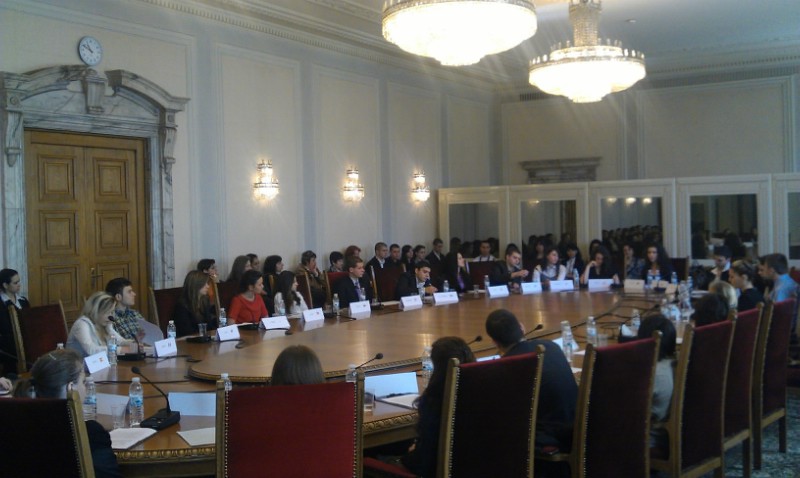National Assembly archive
The Multiannual Financial Framework for the 2014-2020 period was “adopted” by the students of European Studies after serious discussions at the National Assembly
23/04/2012
On April 23th, 2012, the students from the Department of European Studies at the Sofia University “St. Kliment Ohridski” participated in a simulation of a European Council meeting. The initiative was organized by the students and took place with the cooperation of the Chairperson of the Committee on European Affairs and Oversight of the European Funds, Ms. Monika Panayotova. The discussion was dedicated to the future Multiannual Financial Framework for the 2014-2020 period, whose real adoption is expected in the fall of this year.
During the first phase of the meeting, all participants took the roles of respective member state leaders and expressed the position of their countries, identifying the main points of conflict (including the so called “British Rebate”, the proposal for a financial transactions tax, the “European VAT” proposal, the size of the funds on the Cohesion and Common Agricultural Policy, and others) in the positions set forth during the real meetings of the European Council.
The 27 country and government leaders were greeted by Mr. Dobroslav Dimitrov, Chairperson of the Foreign Policy and Defense Committee, who expressed his satisfaction with the chosen format of the discussion. Mr. Dimitrov called for such simulations of discussions on hot topics from the European Agenda to happen more frequently with the participation of both university and high school students because, according to him, this is an effective way to deepen young people’s knowledge and understanding of the processes and policies implemented in the EU.
The Chairperson of the Foreign Policy and Defense Committee emphasized that it is extremely difficult to find solutions equally beneficial for 27 (soon to be 28) member states. He underlined that such decisions cannot be found if policymakers fail to overcome the national populism but seek compromise instead. Mr. Dimitrov expressed his firm belief that the simulation of the European Council meeting dedicated to the Multiannual Financial Framework for 2014-2020 will be marked by compromise because “even Germany is not big enough to stand alone.”
The debate, which lasted for more than two hours, was moderated by Dr. Ingrid Shikova from Department of European Studies. She successfully assumed the role of the European Council’s President, Mr. Herman Van Rompuy, and called for a discussion based on mutual concessions and compromise for the sake of the adoption of the budget in the interest of the European citizens.
The proposed budget was adopted, proving that there are no objectives that cannot be attained when the European spirit dominates the process of policymaking. It remains for us to hope for a similar outcome during the real negotiations this coming fall, when all member states will need to prove their commitment to the common European future of their citizens, defending their national interests with a readiness to compromise.
During the first phase of the meeting, all participants took the roles of respective member state leaders and expressed the position of their countries, identifying the main points of conflict (including the so called “British Rebate”, the proposal for a financial transactions tax, the “European VAT” proposal, the size of the funds on the Cohesion and Common Agricultural Policy, and others) in the positions set forth during the real meetings of the European Council.
The 27 country and government leaders were greeted by Mr. Dobroslav Dimitrov, Chairperson of the Foreign Policy and Defense Committee, who expressed his satisfaction with the chosen format of the discussion. Mr. Dimitrov called for such simulations of discussions on hot topics from the European Agenda to happen more frequently with the participation of both university and high school students because, according to him, this is an effective way to deepen young people’s knowledge and understanding of the processes and policies implemented in the EU.
The Chairperson of the Foreign Policy and Defense Committee emphasized that it is extremely difficult to find solutions equally beneficial for 27 (soon to be 28) member states. He underlined that such decisions cannot be found if policymakers fail to overcome the national populism but seek compromise instead. Mr. Dimitrov expressed his firm belief that the simulation of the European Council meeting dedicated to the Multiannual Financial Framework for 2014-2020 will be marked by compromise because “even Germany is not big enough to stand alone.”
The debate, which lasted for more than two hours, was moderated by Dr. Ingrid Shikova from Department of European Studies. She successfully assumed the role of the European Council’s President, Mr. Herman Van Rompuy, and called for a discussion based on mutual concessions and compromise for the sake of the adoption of the budget in the interest of the European citizens.
The proposed budget was adopted, proving that there are no objectives that cannot be attained when the European spirit dominates the process of policymaking. It remains for us to hope for a similar outcome during the real negotiations this coming fall, when all member states will need to prove their commitment to the common European future of their citizens, defending their national interests with a readiness to compromise.
 Български
Български English
English

